Advertisement
A Yin Yoga Sequence To Boost Your Metabolism & Restore Qi Flow


Spring is a time of renewal, welcoming the opportunity to begin again. By bringing new energy into the light we can let go and detox ourselves from all that no longer serves us. In Traditional Chinese Medicine, each season corresponds to different organs and their meridians — the subtle energy channels through which qi (aka Chi) flows. The liver and gall bladder are connected to the season of spring.
Our liver is the main organ for detoxification, while our gallbladder stores bile produced by the liver, aiding the digestive process. The main job of the liver meridian is to keep the energy in the entire body regulated.
When out of balance, we may physically experience fatigue, migraines, tight hips and low back pain. Emotionally, we may experience erratic emotions such as anger and frustration. When in balance, relief can come in the form of self-compassion, balanced emotions, flexibility to change, and letting go of frustrations. The liver has a huge impact on the overall health of your body, but also on the mind and emotional state.
This Yin Yoga sequence helps to restore the healthy flow of qi through the liver and gall bladder meridians, to support the body’s metabolism and its natural ability to eliminate unwanted toxins and waste products.
During this practice, allow yourself space to feel and completely surface any emotions. While stretching these energetic pathways, notice any of the physical sensations that may accompany that emotion. With each exhalation, release these emotions and let them go, offering compassion to the situation or person causing you tension.
The three principles of Yin Yoga:
1. Come into each pose to your appropriate edge, finding the place where you feel a sensation. If you’re feeling it, you’re doing it.
2. Resolve to remain still while focusing on your breath and present experience, accessing beyond the muscles to deeper connective tissues.
3. Hold each pose for an extended period (3-10 minutes), allowing yourself time to truly open into the posture, resting in-between each pose to feel the after-effects.
Reclining Butterfly Pose (Supta Baddha Konasana Variation)
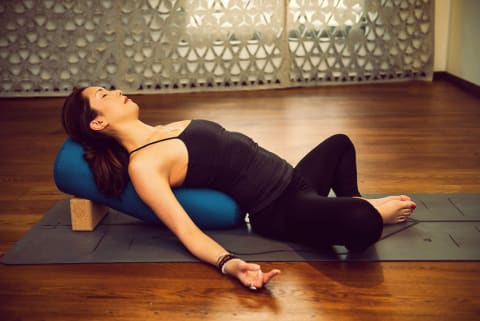
Lying back on a bolster, bend your knees and bring the soles of your feet together, allowing the legs to open. Relax the inner thighs and groin. Bring some gentle spinal extension into the pose opening across the chest and at the front of the shoulders.
To come out, bring your hands to your knees to help the thighs back together. Mindfully come off the bolster.
Lying on your back with knees bent and feet mat-distance apart, windshield wipe your knees from left to right. Hug your knees into your chest and rock side-to-side for a few breaths.
Sphinx Pose (Salamba Bhujangasana)
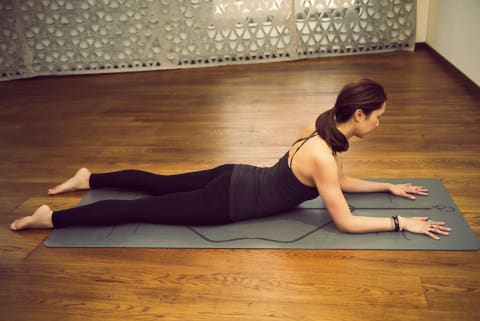
Lying on your belly with bent elbows, bring your hands and elbows shoulder-distance apart and slightly in front of your shoulders with palms facing down. Distributed your weight equally across your forearms.
Allow your shoulder blades to draw back and down. Soften the belly, buttocks, thighs and feet. If it feels too intense, take the elbows forward or place a bolster below your underarms.
Seal Pose (Bhujangasana Variation)
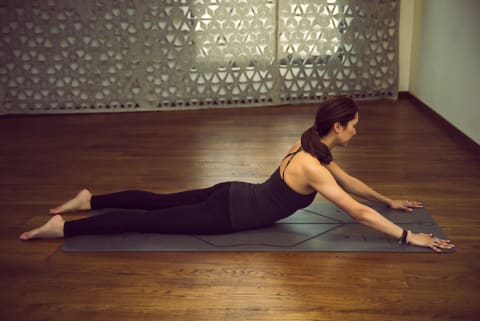
For last minute, go deeper by lifting up into Seal Pose. Straighten your elbows and bring your arms forward to a 45-degree angle with your weight evenly distributed across both palms. Soften the belly.
To come out, slowly lower yourself down to the earth by making a pillow with both hands. Turn your head to the right and change sides. Notice any subtle change in your energy as you come out of the pose.
Child's Pose (Balasana)
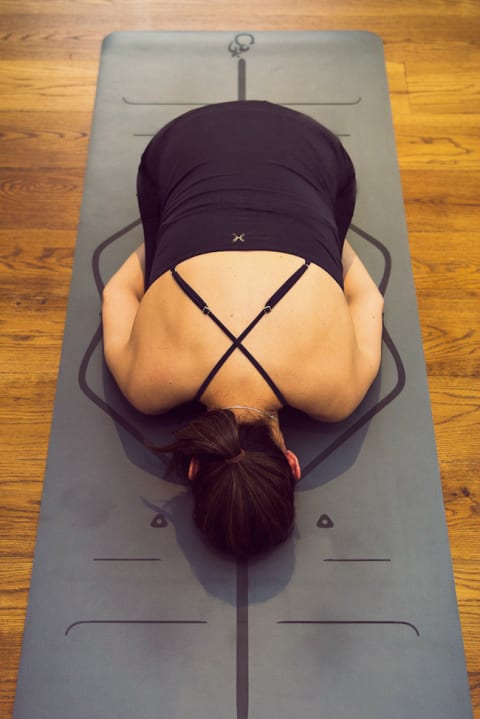
Come to sit back onto your heels. Exhale and lay your torso down between your thighs. Notice any subtle shifts in energy.
With each exhalation, try dropping even further into this shape.
Sleeping Swan (Eka Pada Rajakapotasana Variation)
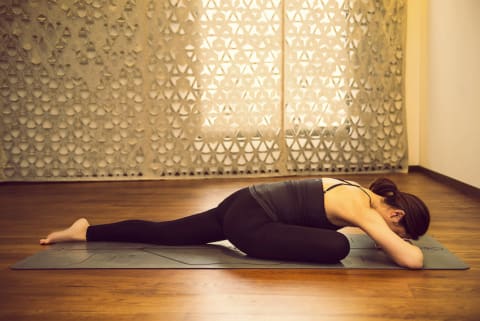
From all fours or Downward Dog, bend your right knee and place it by your right wrist. With your right foot flexed, lower the pelvis toward the floor and allow the left leg to lengthen behind you.
Inhale to lift your heart, and exhale to slowly lower down to the earth. If you feel pressure in the right knee, slide your right foot in toward your seat. Use a block or pillow under your seat if your hips are floating off of the ground.
To come out, shift your weight over to the left side and begin to lift the right leg up and back. Come into Child's Pose for a few breaths before changing sides. Again, notice any subtle energy shifts coming out of the previous pose.
Eye-Of-The-Needle Pose (Sucirandhrasana)
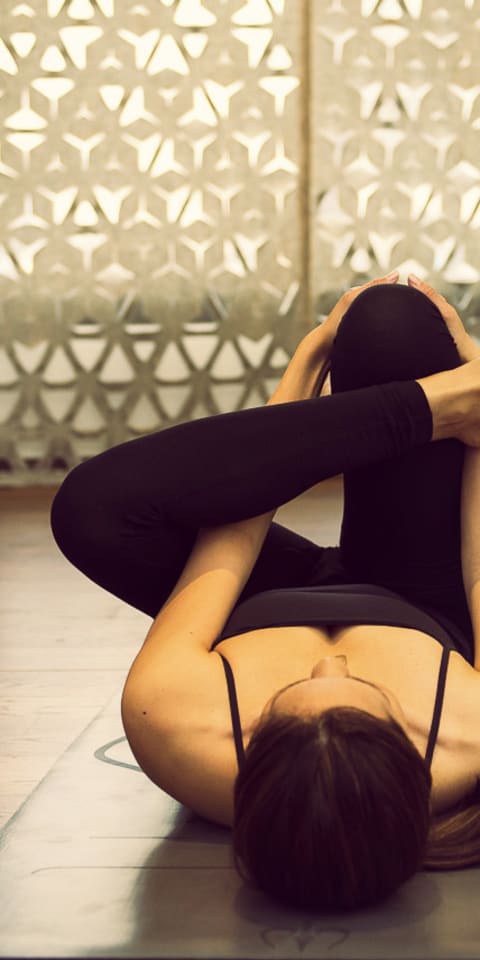
As an alternative to those not able to perform Sleeping Swan, Eye-Of-The-Needle is a fine modification and still a deep hip opener.
Lying on your back, cross your right ankle on top of the left thigh and send the hips back, so the body takes the shape of a number four. Breathe deeply into the lower back and outer hip.
As you exhale, imagine any tension or stress (mental, physical, emotional) leaving the body. Changing sides, repeat with the left ankle.
Dragonfly Pose (Upavistha Konasana Variation)
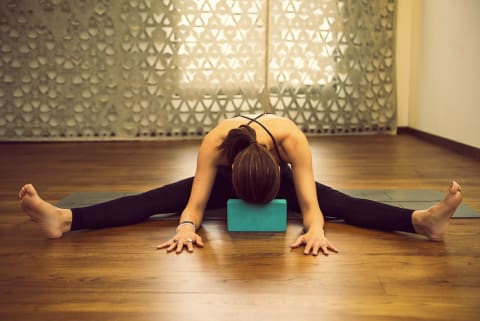
From sitting, separate your legs a comfortable distance apart. Soften the leg muscles and feet. Begin to walk your hands forward and bow your head.
Rest your brow on the mat, a block or bolster, allowing the upper back to slightly round. If if feels too intense, stay upright with your spine.
For the last minute, change the positioning of the prop or remove it entirely to go deeper. Exhale as you fold deeper.
To come out, inhale and bring your torso upright and with your hands under the knees to gently bring them back to center.
Supine Spinal Twist (Supta Matsyendrasana)
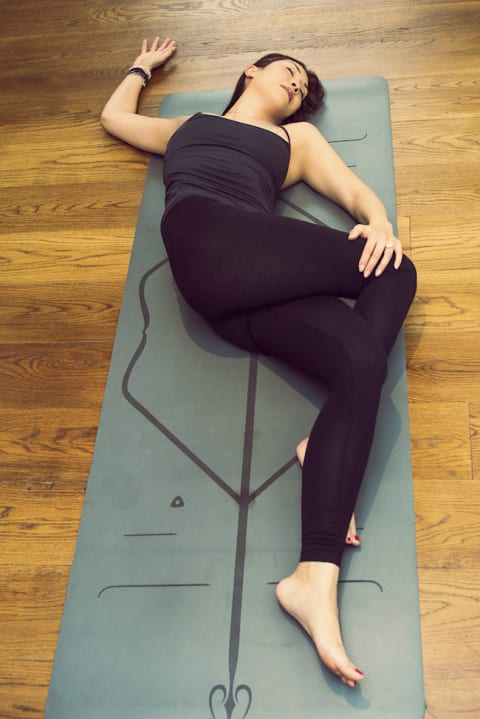
Cross your right leg over the left, allowing your legs to fall, with control, over to the left side. Your right arm is outstretched above in a cactus shape, and left hand over the right knee. Take your gaze toward the left.
Let go of all tension, imagining the earth supporting you and taking away any unwanted energy from your body.
You can place props under your knees to support the weight of your legs. To come out, bring both arms down by your side returning both legs straight to center. Changing sides, repeat twisting to the right.
If it does not feel good to have the legs crossed over one another, you can do a simple twist instead with the legs uncrossed. Fold to the right side first and then changing sides, twist to the left.
Savasana With Bolster
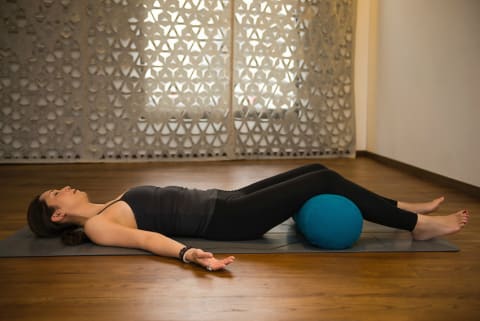
Place a bolster under your knees with your arms by your side, palms facing the sky.
Take three deep cleansing breaths to release any residual energy, with deep inhales through the nose and exhaling through your mouth. Repeat twice more, then allow your breath to flow naturally.
With each exhalation let go, release and fall deeper into this space. Namaste.
Photos courtesy of the author